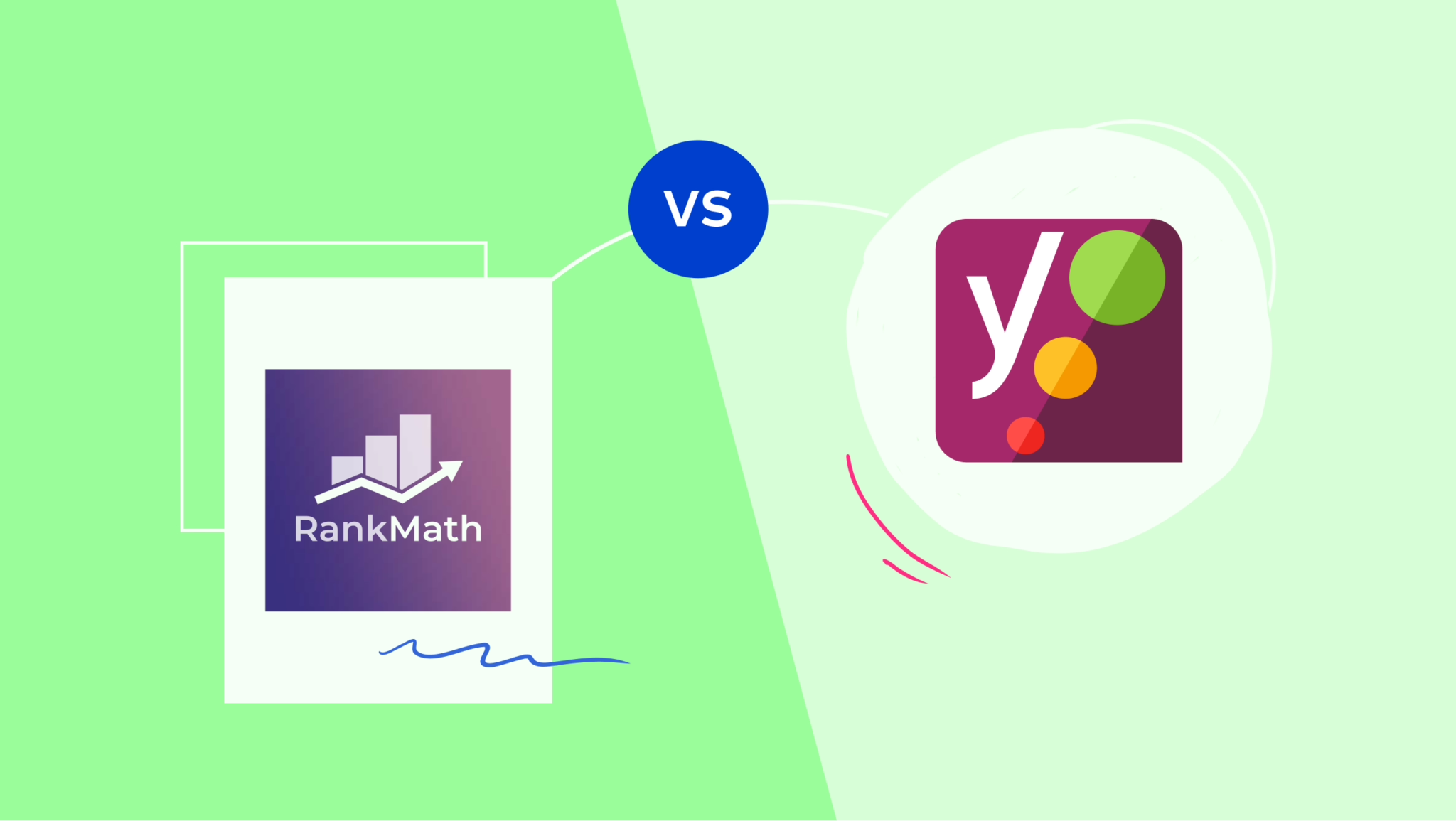Do you have to choose between Yoast SEO and Rank Math? Over the last two years, many people who use WordPress have been going through the same agonising choice. Because every WordPress website needs the right SEO plugin. We analyse both plugins for you: Which is definitely the better one?
For many years, Yoast was the only thing people talked about when they thought of an SEO plugin for WordPress and WooCommerce. With more than 5 million active installations, the extension has simply established itself as the standard. However, a new provider has been enjoying increasing popularity since June 2017: Rank Math. Since then, Rank Math has managed to establish itself as a strong alternative to Yoast SEO – and is building an ever-growing community.
In this article, I would like to help you decide which SEO plugin is right for your WordPress website. Who scores highly for keywords and metadata, who for usability, where do you get the most bang for your buck?
What does an SEO plugin do?
Before we get to the showdown between the two plugins, however, I would like to dispel a myth about “SEO”. It happens time and again that I meet with customers for an initial consultation and they are baffled by the wide range of measures involved in search engine optimisation.
In online marketing, many people think that installing an SEO plugin is sufficient for optimisation.
Sure, such a solution helps you to position yourself better for Google & Co. But neither Yoast SEO nor Rank Math are all-rounders.
The providers of some SEO solutions out there are partly to blame for the persistence of this myth. This is because they advertise that they can completely take over the search engine optimisation of your WordPress website – RankMath and Yoast SEO are no exception.
But there is so much more to search engine optimisation of your WordPress website! Starting with the speed of your website, keyword research or your content. One example of this diversity is the periodic table of ranking factors from Search Engine Land. Each element stands for a significant ranking factor:
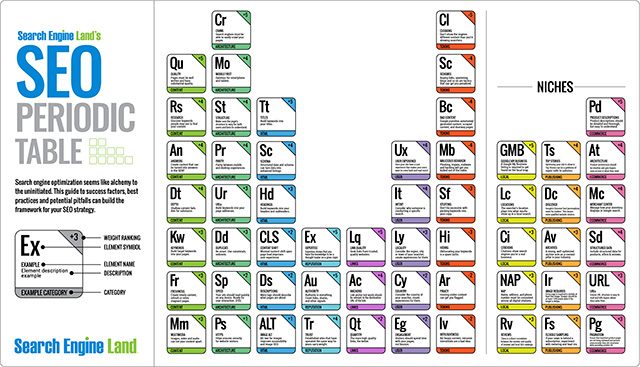
Read the following tutorials carefully before using an SEO plugin:
- Step-by-step guide to keyword research
- 8 steps to better rankings
- WordPress SEO & text optimisation
- Make WordPress faster
- More success with the right content (e-book)
These include optimisation measures for which SEO plugins do not support you at all or only insufficiently. You should therefore be aware of these in advance.
An SEO plugin alone is not enough
Installing an SEO plugin alone will therefore only help you to a limited extent. Even if some extensions and testimonials on the market would have you believe otherwise. Switching to a different plugin will almost never magically double your traffic.
The typical tasks of an SEO plugin include technical functions that take place in the background:
- Giving the search engines instructions on which content or URLs on your website may be crawled
- The provision of instructions for crawlers in robots.txt
- Generating a sitemap with WordPress
- The keyword analysis of your posts including possible SEO recommendations for action
- The management of your redirects
- Provision of structured data, more on this later
But enough theory. Let’s talk about what makes Yoast SEO and Rank Math different.
About Yoast SEO
Yoast SEO has been supporting WordPress since 2008 and is based in the Netherlands. According to its own information, more than 140 employees currently work for the company. Founder Joost de Valk was replaced by Thjis de Valk at the end of 2021.

With over 5 million active WordPress installations, Yoast SEO is currently the most popular SEO plugin for WordPress. What I personally find very positive is that the team is involved in the promotion of WordPress, even outside of their own product. This makes the company a part of constantly improving WordPress for all users.
There is a limited, free version of the plugin. The premium upgrade of the plugin currently costs 99 euros per WordPress website per year. The plugin can also be enhanced with additional functions, such as video SEO or local SEO, through paid extensions.
About Rank Math
Rank Math comes from the team behind “MyThemeShop”. According to WordPress.org, the plugin is currently used on over 1 million active WordPress websites.
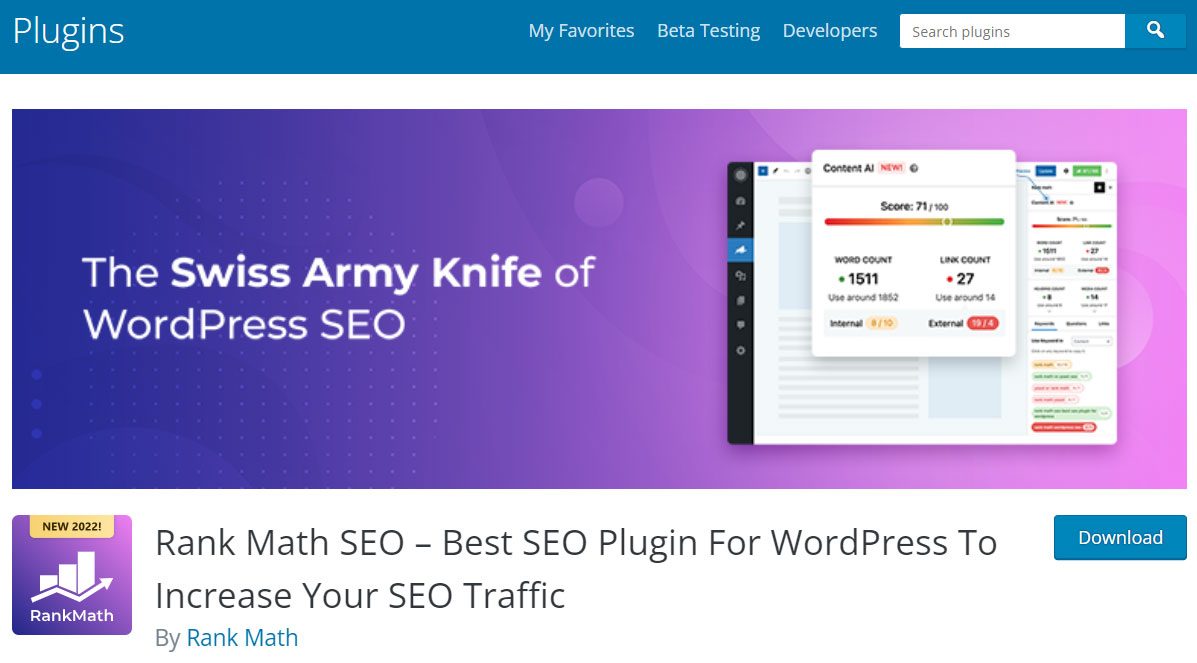
Points of criticism in the past were a lack of transparency, for example in the connection to the Google account or API. Or the question of who was behind the SEO plugin and provided significant support for the project. The background to this is probably that the company has its origins in India. In the meantime, however, the provider no longer has to hide and is much more open about its origins.
I’ve been watching Rank Math since July 2017, when I was invited to the closed beta of the plugin. Since then, many functions have been added to the plugin. At that time, there was no premium version of the plugin. The promise to keep all previous free functions of the plugin even after the release of the premium version was kept. So a plus point for honesty.
Content marketing for advanced users: The 6 most important levers
Discover how to optimize your content marketing to reach the right audience, build trust, and achieve long-term success.
The majority of the most important functions are free of charge. Compared to Yoast SEO, however, the monetisation does not include additional extensions. Upgrading to the premium version of the plugin gives you access to all premium functions. The plugin can also be used on multiple websites.
Memberships are staggered as follows:
- Pro: Unlimited personal websites for currently 59 dollars a year
- Business: Up to 100 commercial websites: $199/year
- Agency: Up to 500 commercial websites: $499/year
Comparison of free functions
Both Rank Math and Yoast SEO come with all kinds of free features. Here is a complete overview. However, you should check the respective status again before your purchase, as the scope is constantly being expanded:
| Function | Yoast SEO | Rank Math |
| Optimisation of the focus keyword | x | x |
| General SEO recommendations for the optimisation of articles | x | x |
| Help with keyword research | (limited – Semrush integration) | (chargeable – based on credits) |
| Customisation & preview of meta title and meta description | x | x |
| Crawlability and indexing settings for different areas of your website (posts, pages, categories) | x | x |
| Generating an XML sitemap | x | x |
| Manual adjustments in the robots.txt | x | x |
| Manual adjustments in the .htaccess | – | x |
| Adjustments in the RSS feed | x | x |
| Management of your redirects | (premium version for a fee) | x |
| Generating a table of contents | x | – |
| Structured data (breadcrumbs) | x | x |
| Structured Data (FAQ) | x | x |
| Structured Data (HowTo) | x | x |
| Structured data (recipes) | – | x |
| Generating structured data for images | x | x |
| Selection of structured data types for an article (e.g. medical content, satirical content) | x | x |
| Structured data for channels on social media | x | x |
| Optimisation for Google Knowledge & Open Graph | x | x |
| Structured data (local companies) | (chargeable extension) | x |
| Structured Data (WooCommerce) | (chargeable extension) | x |
| Structured Data (Google News) | (chargeable extension) | (with costs) |
| Structured Data (Google Video Search) | (chargeable extension) | (with costs) |
| Optimisation for Google AMP websites | (free extension) | x |
| Optimisation for Google WebStories | – | x |
| Optimisation for BuddyPress | – | x |
| Optimisation for Advanced Custom Fields | (free extension) | x |
| SEO additions for uploaded images | (minimal) | (minimal) |
| Google Analytics integration | – | x |
| Google Search Console integration | – | x |
| Google AdSense integration | – | x |
| Google Analytics integration | – | – |
| Google Analytics 4 Integration | – | x |
| Google Search Console integration | – | – |
| Recommendations for speed optimisation | – | (minimal) |
| Unnecessary functions can be deactivated | x | x |
| Role management for registered users | x | x |
| WordPress Rest API (Headless CMS) | x | x |
| Zapier Integration | (chargeable extension) | – |
Let’s now take a look at some of the functions of the plugins, also in direct comparison.
Keyword analysis
When it comes to optimising your posts for individual keywords, both Yoast SEO and Rank Math offer you some recommendations for action. However, these are only general SEO recommendations.
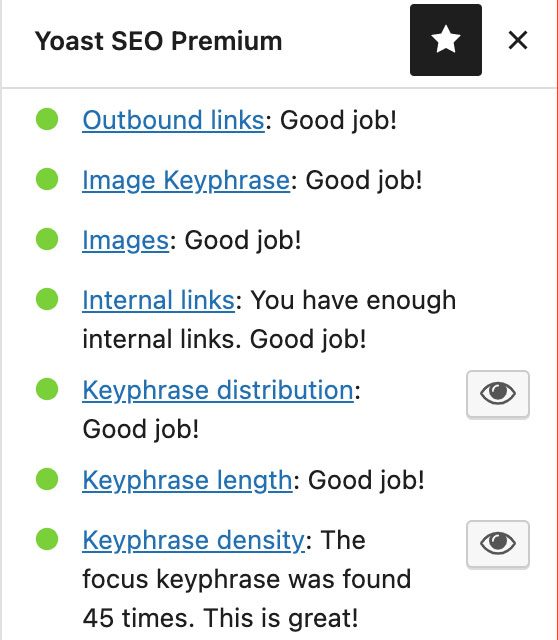
For example, how high the keyword density is for your selected search term. Or that images could improve your post. By choosing a focus keyword, the plugins assume that you already know exactly which keyword you want to optimise for.
Guide to keyword research
Researching suitable keywords is an important SEO lever. I’ll guide you step by step through the entire process with my keyword research tutorial. Including recommendations, examples and tools.
Recently, however, Yoast SEO has gone one step further. If you activate the SEMrush integration in the plugin, you will receive ideas for additional keywords from the SEMrush database, including search volumes, in the post editor. A practical thing.
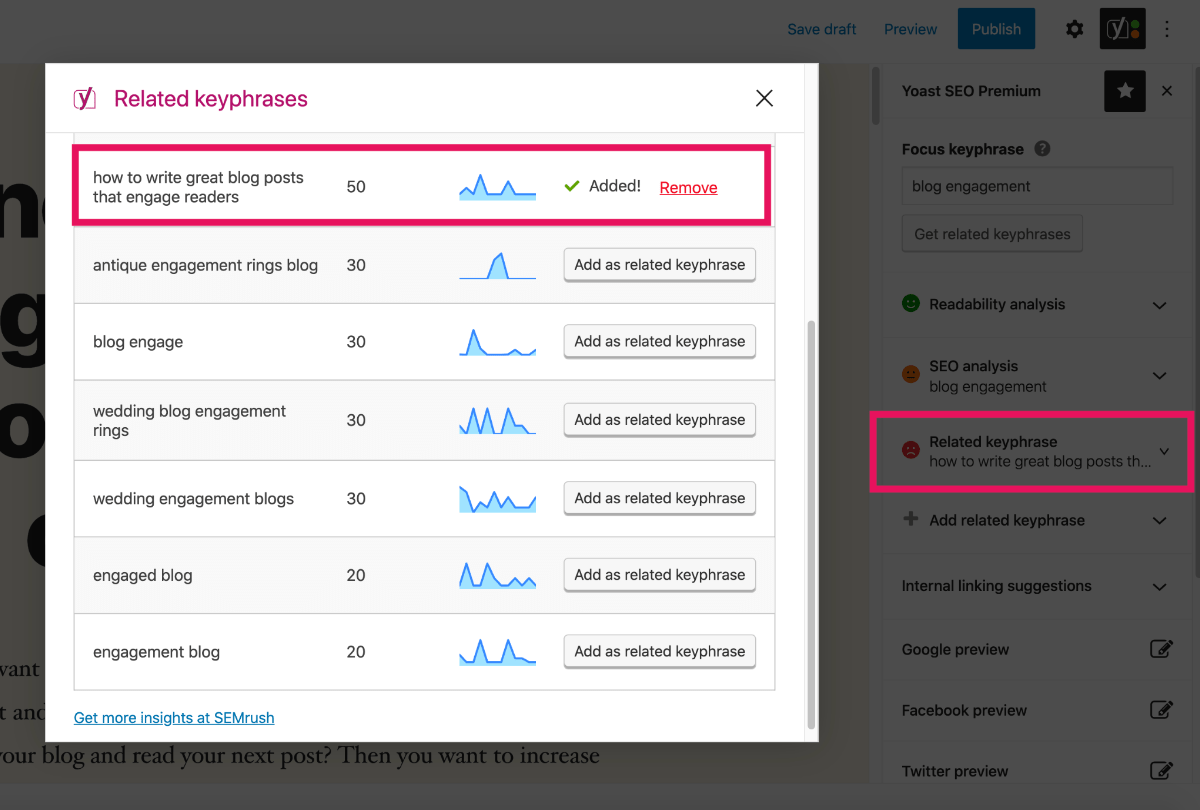
With a free SEMrush account, you can perform up to 10 keyword queries per day. The suggested keywords can then supplement your focus keyword in the keyword analysis. The aim of this function is to give you inspiration as to which topics could be added to your post.
The readability index (Flesch test) is also calculated by the plugin:
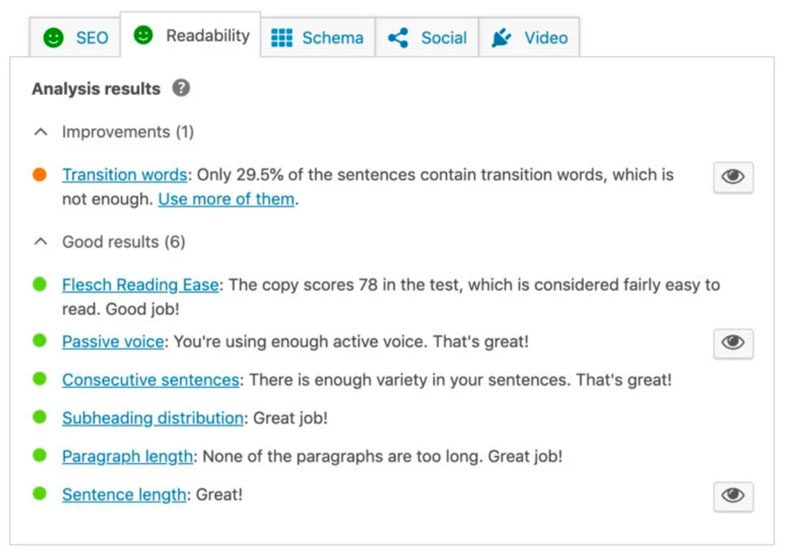
The premium version of the plugin also gives you recommendations for internal links. This helps to distribute the incoming link juice to other posts and keep users on your domain for longer. However, I personally never found the advice really helpful.
Rank Math’s keyword analysis is strongly orientated towards Yoast SEO. You can also find it in the sidebar of the Gutenberg Editor:
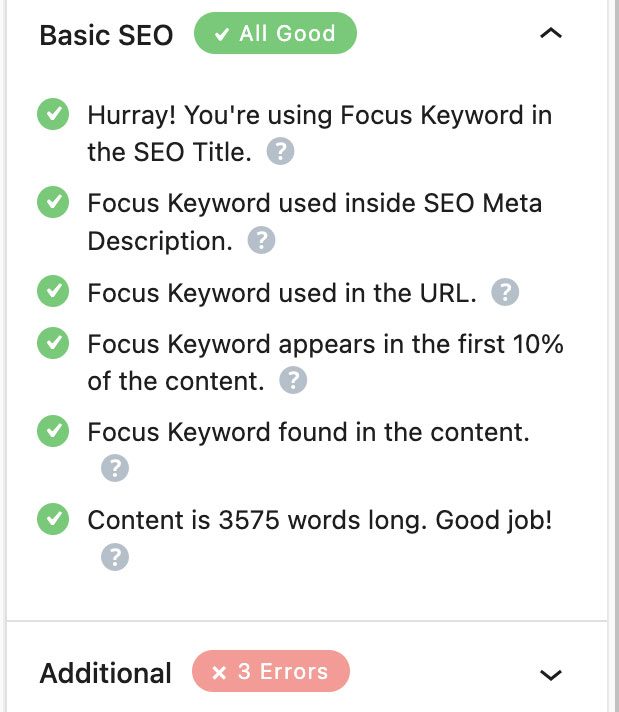
The recommendations range from the usual, general SEO recommendations (similar to Yoast) and a readability index to separate tips to improve the title of your website. This tip is quite nice, as a meaningful meta title will help you improve the CTR (click-through rate) of your posts in the search results.
The selection field for the focus keyword, i.e. the keyword you want to optimise for, should be emphasised. When typing in a keyword, the plugin uses Google’s autocomplete feature. SEO beginners in particular receive useful recommendations directly from Google’s input mask. And these are sorted according to their search volume. Perfect!
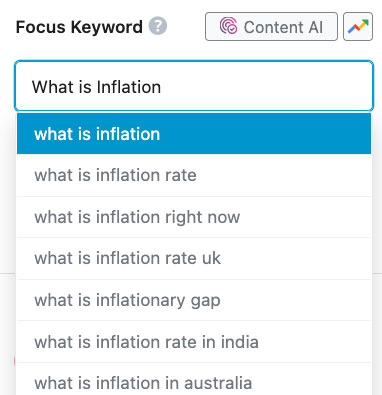
Rank Math takes a different approach to keyword research than Yoast SEO. And it has it all! As an alternative to Semrush, Rank Math offers the credits-based Content AI function.
You will achieve the greatest benefit if you already know which keyword you want to optimise for. Preferably one with a high search volume. Content AI scans the web pages from the search results for your keyword and analyses the minimum requirements your post must meet in order to stand up to the competition.
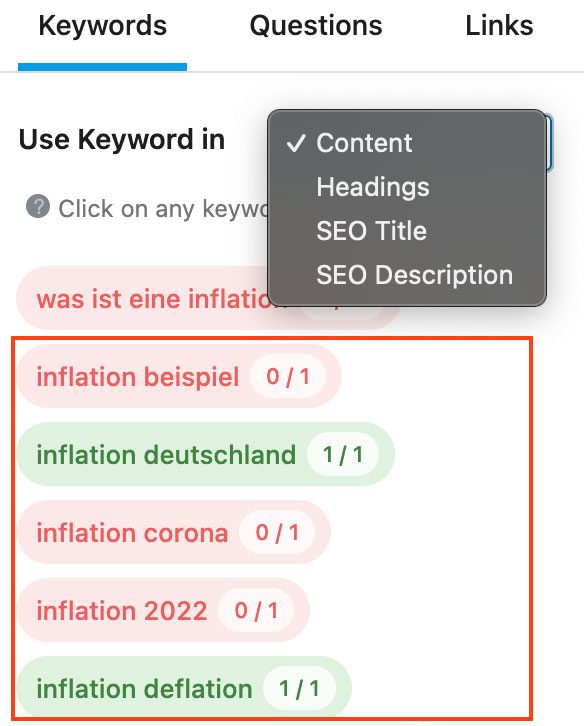
The feature also provides useful recommendations for related keywords or questions that have been used in the competition’s content. This makes analysing the competition much easier. The following video explains how it works once again:
Please remember that these queries are made via a credit-based, fee-based system. You use one credit per query.
The conclusion in the keyword analysis: The general SEO recommendations are almost identical for both plugins. In the integrations (Semrush, ContentAI), both plugins take different paths. However, Rank Math’s user interface has the edge and is somewhat more beginner-friendly.
Upselling, cross-selling & measuring success
Discover how to effectively measure and boost cross-selling opportunities with actionable strategies tailored for agencies and freelancers on the Raidboxes blog.
Tip: Green lights in both plugins are no guarantee for better rankings, over-optimisation costs valuable time. Make sure you select the right focus keyword from the outset.
Meta titles and meta descriptions
Both Rank Math and Yoast SEO allow you to customise the meta title and meta description of your posts in the Gutenberg editor. In terms of the user interface, Rank Math has again been strongly orientated towards Yoast SEO:
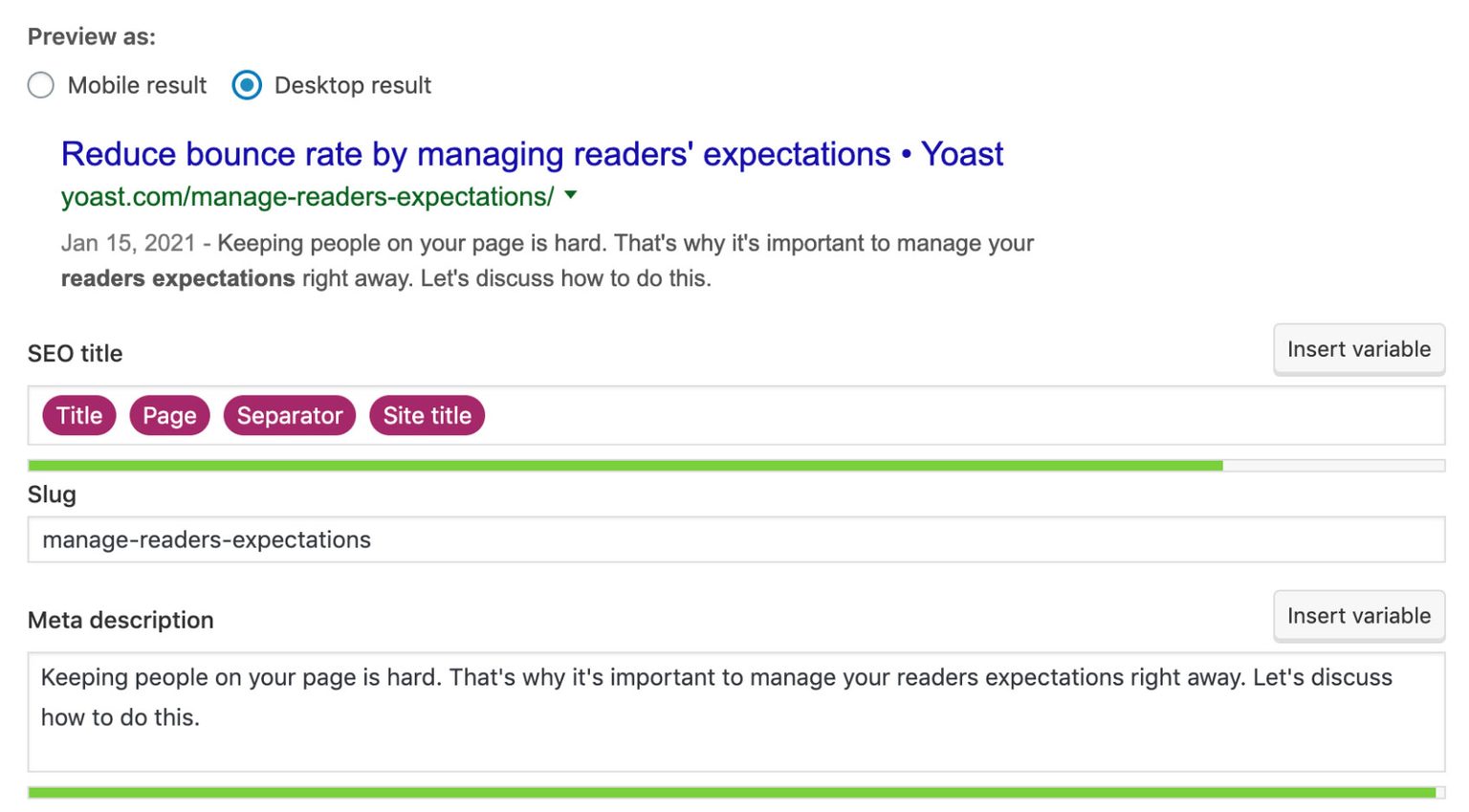
In addition, both plugins allow you to decide which parts of your website may or may not be indexed by default.
Conclusion: Both plug-ins are so similar in terms of the user interface that there is a clear draw.
Structured data
For many WordPress users, “structured data” is still a foreign concept. Depending on your industry, structured data can make up a large part of your SEO strategy. The following video from Yoast SEO clearly explains what structured data is:
Structured data adds information to your website or content or activates suitable displays in the search results. You know the rating stars below the search results? These are displayed using structured data. See also the list of rich snippets that Google supports in the search results.
On the one hand, there is the technical side, which both SEO plugins automatically implement for you in the background. Each plugin scans your posts and automatically adds the structured data for headings, images, etc. in the background.
This looks almost identical in both plugins. The difference lies in the number of recognised schema elements. Yoast SEO summarises the different schema types in a coherent code. Yoast explains how it works very well in the documentation:
Yoast SEO is the first WordPress plugin that automatically generates structured data as a single, interconnected graph instead of individual blobs of data. Let’s look at an example: a post here on Yoast.com. This post is an article. The article is the main “thing” of a WebPage, which is part of a Website. This Article is published by an Organisation and written by an Author. Both the Author and the Organisation have social profiles attached to them. These separate blocks are now all woven together: it’s simply a nested structure.
To be fair, it has to be said that the solutions of both plugins are technically correct. In my opinion, however, Yoast SEO’s solution is the more sensible one.
However, this is only what happens in the background: To utilise the full potential of structured data, you need to take action yourself. Firstly, you should know whether there is structured data that could benefit your company:

Yoast SEO provides you with Gutenberg blocks for this purpose(FAQ boxes and How-To). There is also a Gutenberg block for atable of contents that integrates seamlessly into the structured data output. A feature that Rank Math does not yet have.
Yoast SEO also offers the option of specifying the type of content for each post:
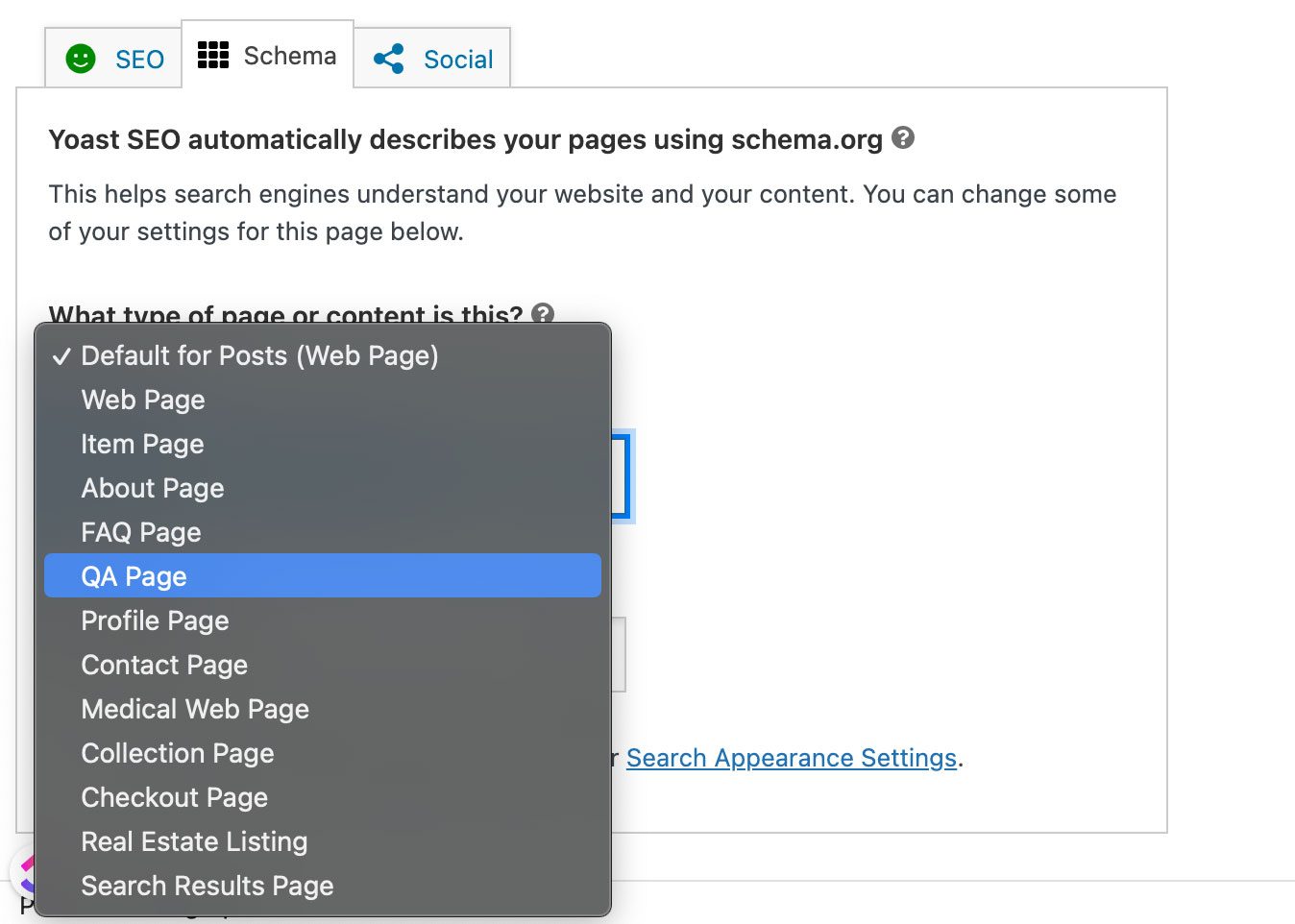
A major disadvantage of Yoast SEO is that not all types of rich snippets are supported. Yoast SEO also charges dearly for additional extensions for structured data via the add-ons for Local SEO, Video SEO and WooCommerce. An extension costs 79 euros per year and per WordPress website. With Rank Math, however, many of these functions are free of charge, for example for Local Business and WooCommerce.
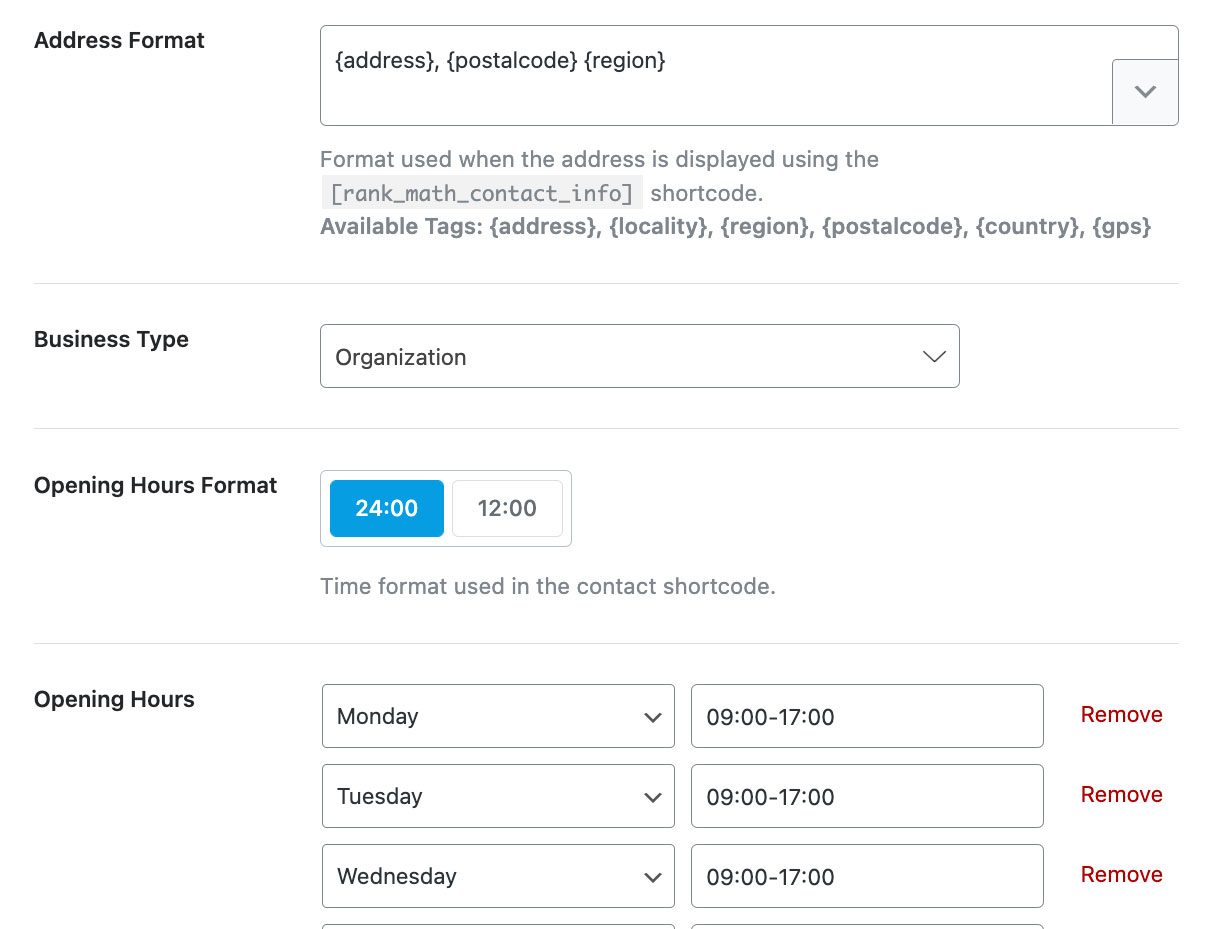
Structured data for local companies can be easily added in the Rank Math backend. And just like with Yoast, you can specify the type of content in more detail.
How to start a corporate influencer program
Turning employees into corporate influencers is a powerful way to boost brand trust and reach – learn how to start your own program and who to follow for inspiration.
At the same time, Rank Math has another advantage over Yoast: the immense number of schema types supported by Rank Math. Using the schema generator, structured data can be easily added for each post.
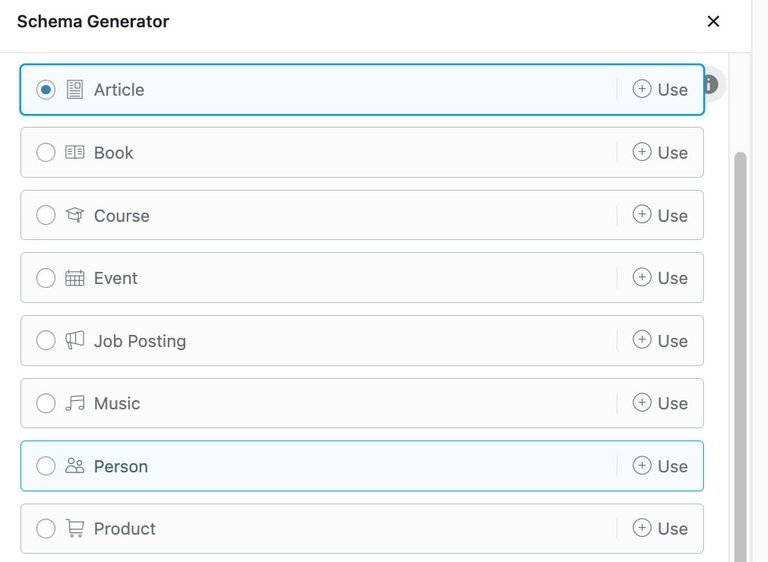
In the Pro version of Rank Math, the advanced schema generator even allows you to generate your own schema templates. An incredibly powerful tool, but one that is more suitable for experts.
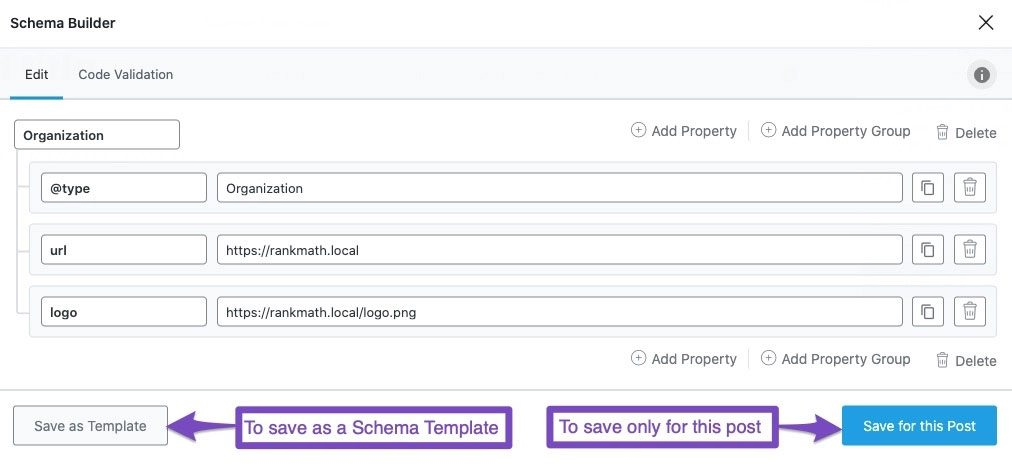
An FAQ block and HowTo block are also included in the Gutenberg Editor:
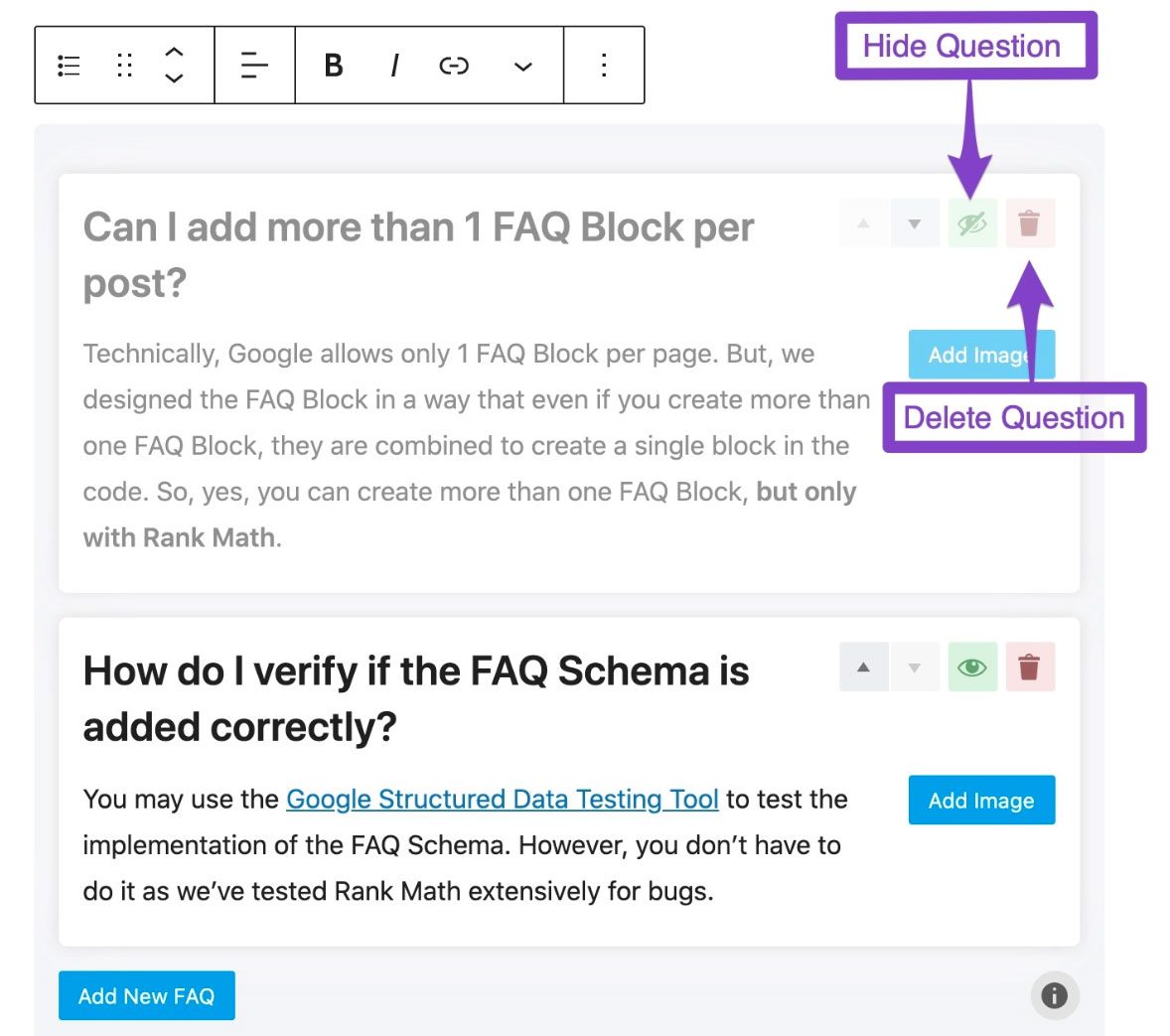
The conclusion: Rank Math is more comprehensive in terms of the number of tools for structured data. However, Yoast SEO convinces with the better implementation.
404 errors and redirects
Redirects are one of the most important applications used in search engine optimisation. URLs and content can change or even be permanently removed. And redirects tell a search engine what has happened to the resources on your website.
If a URL changes and you don’t let the search engine know where this URL can now be found, you will also lose the ranking you have gained. It’s as simple as that.
New users in particular, who are not familiar with SEO, regularly change URLs or delete content. That’s why I’ve always found it strange that Yoast SEO only offers this important function in the premium plugin. In Rank Math, on the other hand, this option is already available in the free version.
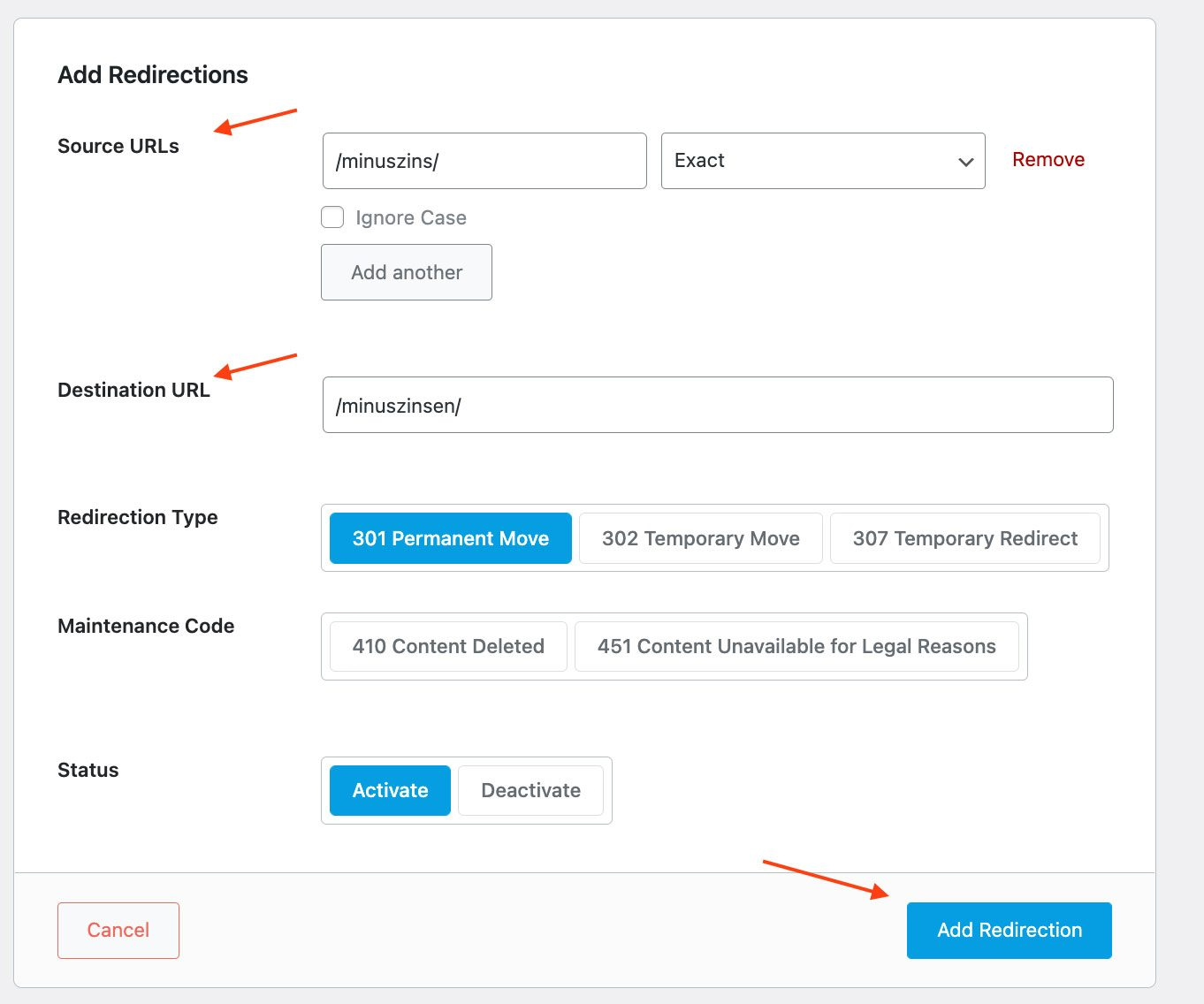
Both plugins create an automatic redirect if you change the URL of a category, post, etc. for any reason. Attention: With Yoast SEO only in the premium version.
Rank Math has an additional extension, the 404 monitor. This records when users or bots have called up a non-existent URL. This can be a useful addition for web shops or large websites.
Suppose a large number of users call up the domain “examplepage.com/t-shirt/”, even though this URL does not exist within your domain. Instead of sending these users to a frustrating 404 page, you can now redirect them to the right place.
My conclusion with a clear winner: Rank Math.
Tips for speed optimisation
Content is important for search engine optimisation. But so are speed and mobile-friendly websites. You’ve already made a good choice with Raidboxes as your host. But you can optimise your loading times and thus the user experience even further.
That’s why I think it’s a shame that both plugins hardly point out the optimisation of loading times to their users. The Yoast SEO plugin does not provide any information on what to look out for when optimising speed.
At least in the SEO plugin of Rank Math Plugin there is, somewhat hidden in the SEO analysis tab, a small indication of the loading times. Unfortunately, only the start page is analysed here:
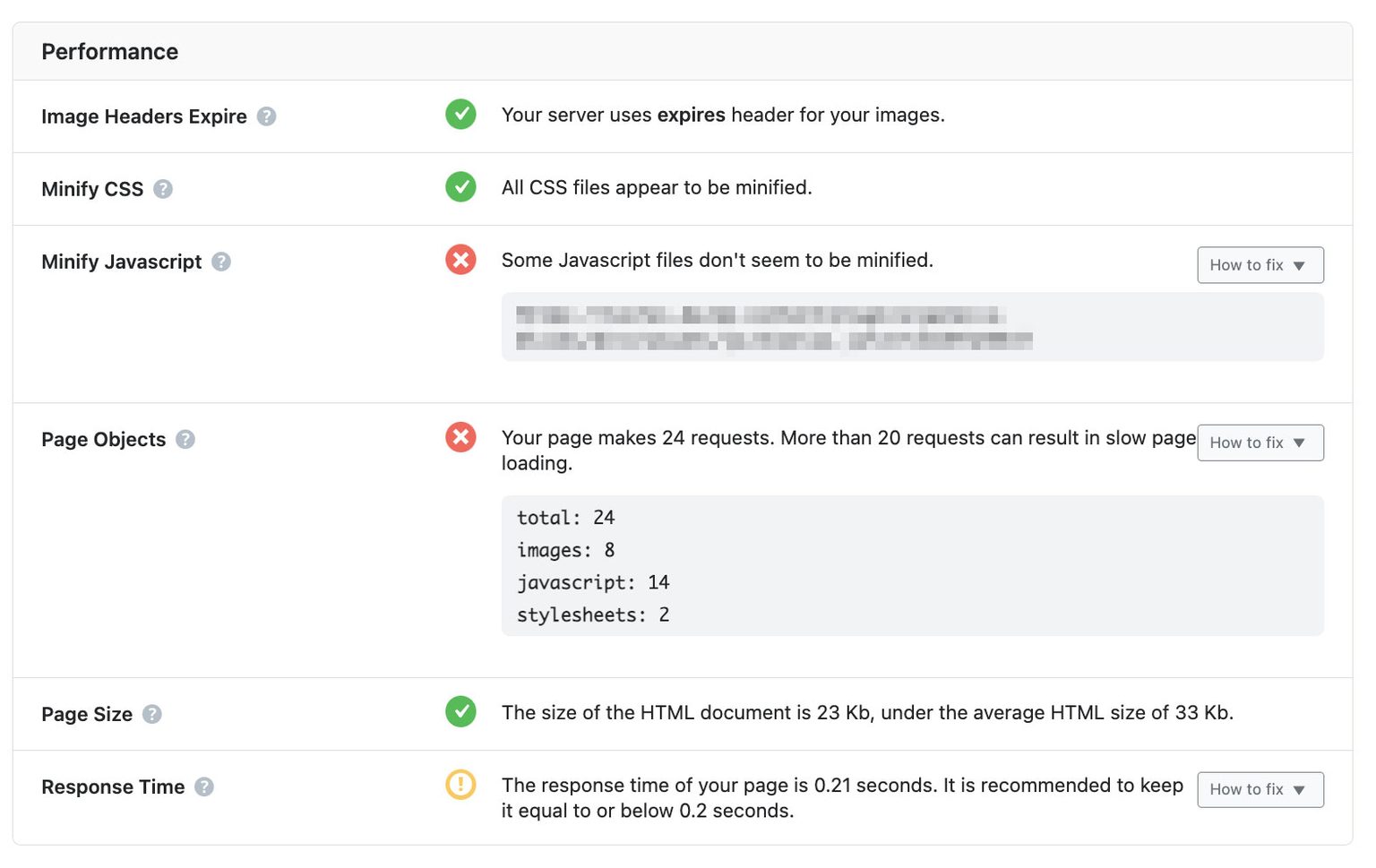
If you use the premium version of the plugin, you can display the PageSpeed value of each WordPress page in the admin bar. That’s already a step in the right direction.

In my opinion, however, both plugins miss out on the potential to better train your own users on this problem.
The conclusion: Both plugins don’t have much in common, but Rank Math has taken a first step in the right direction.
Images SEO
What conclusion can you draw between Yoast and Rank Math when it comes to search engine optimisation of the images on your website? In a nutshell: Neither plugin can boast any features here. Because SEO for images is complex. Important optimisation measures, such as compressing images, must be retrofitted with other plugins.
Yoast SEO only carries out two optimisation measures in the search engine optimisation of your images. Firstly, Yoast adds the number of images used in the schema code of your website (see the explanation above on Structured Data). This specifies whether an image is the logo or part of a post.
And then Yoast SEO also gives you the option of automatically redirecting the attachment URLs generated by WordPress:
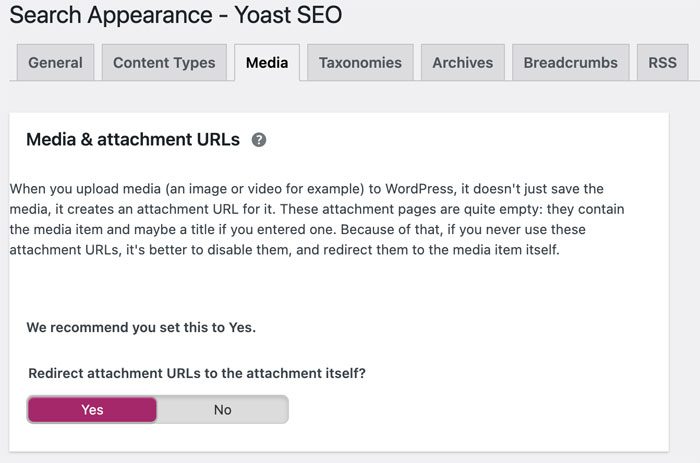
But what about the alt attributes that are so often forgotten by users? Yoast does point out missing attributes in the post editor, but this should actually be easier.
Rank Math has also recognised this. That’s why the WordPress plugin automatically adds the alt attributes for all uploaded images based on the file name. So you only ever have to make sure that you name the image correctly before uploading it to the WordPress media library. And this workflow can save a lot of time and sources of error.
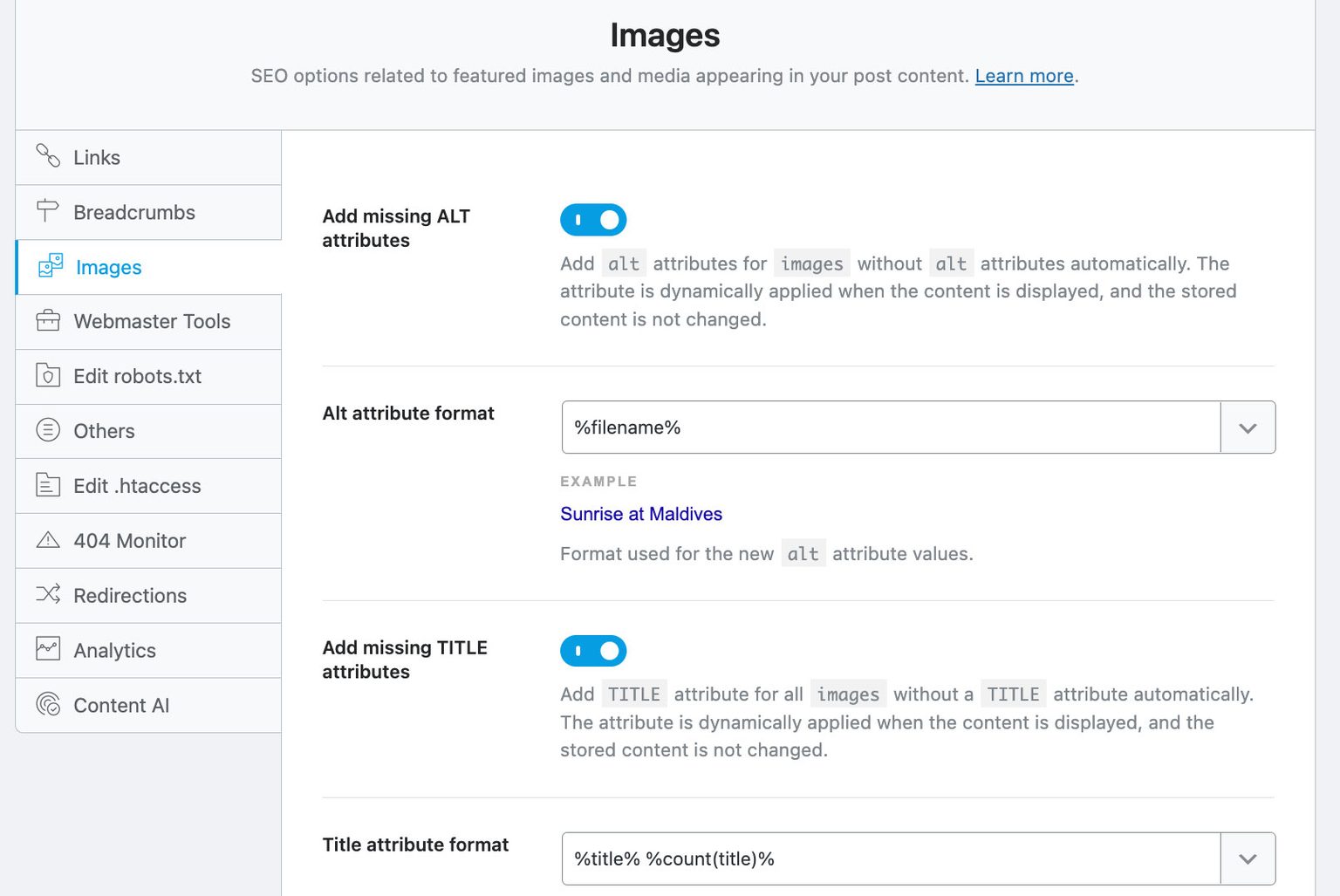
The conclusion: Unfortunately, both plugins only scratch the surface of what is possible and important with image SEO. Nevertheless, Rank Math wins for me, even if only by a marginal margin.
My tip: In the Pro version of the plugin, you can also add watermarks. However, this has absolutely no effect on search engine optimisation.
Modular plug-in structure
For a long time, Rank Math had advertised that the plugin’s code should be significantly less cluttered compared to the competition.
Options that you don’t need can be easily deactivated in the backend. This allows you to customise the functions in your SEO plugin as you need them.

Yoast SEO has now also caught up and allows you to deactivate unnecessary functions in the backend. In addition, the Yoast SEO team has done a lot in the last two years to make its own plugin a little more efficient. Although many things have improved as a result, Rank Math is still ahead in terms of speed.
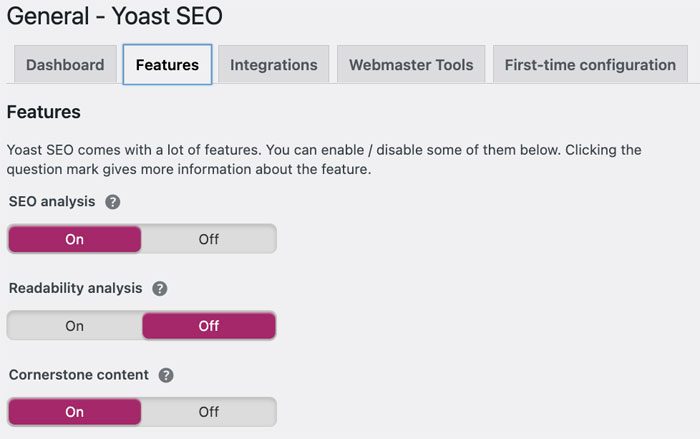
One development that I see as negative with Rank Math is that the plugin is moving in the direction of an all-in-one marketing tool. There are many functions integrated into the plugin that have little or no effect on the search engine optimisation of your website. For example, AdSense, statistics in the backend and watermarks for images.
Nevertheless, it is good to see that the competition between the two plugins has a positive influence on each other. The winner in this category is: Rank Math.
Analyses and statistics
For beginners, it may be a useful feature to be able to analyse Search Console, PageSpeed and Analytics data in the WordPress backend. As an SEO expert, however, I try to keep such information out of my WordPress installation.
Yoast SEO does not offer any analyses or statistics in its own plugin. With Rank Math, data from the Search Console and Google Analytics can be analysed in the WordPress backend.
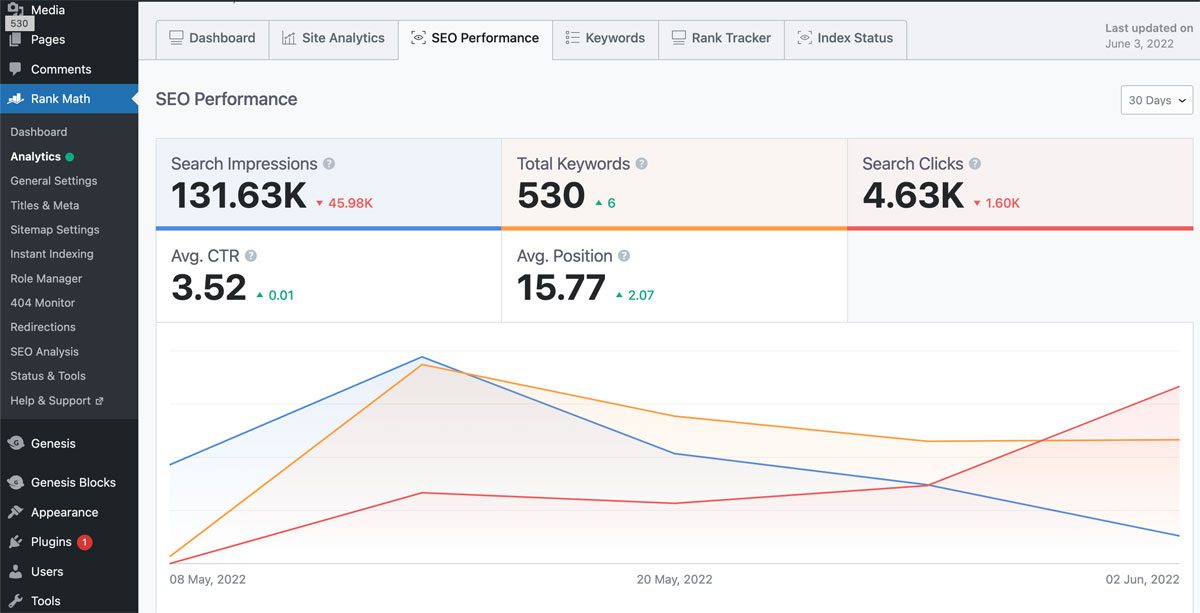
You also get an overview of which posts and pages generate clicks in the search results, or the average position they rank in the search results. And, as in any SEO analysis, an evaluation of the keywords is a must.
One powerful feature is somewhat pushed into the background: In the “Index status” menu item, you can check which of your posts and pages are indexed in the Google search results and whether they have passed the test for mobile devices.
Rank Math also offers an additional function in the “SEO Analysis” menu to check your WordPress website globally for potential SEO errors. For those who do not want to install the plugin, there is an online version available for testing.
However, I would be very careful when analysing these results. For example, after analysing the page, the plugin gives me the following results:
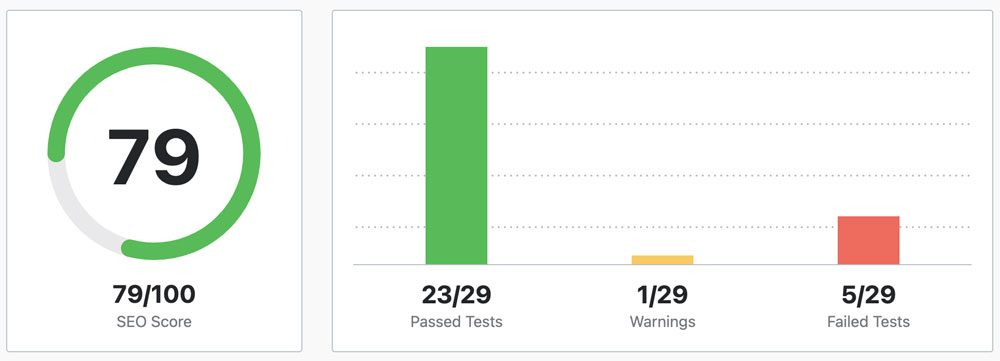
In the “Advanced SEO” tab, my test website even achieved 100 out of 100 points. The first impression: there is not much to do here. On closer inspection, however, it becomes clear that the results only relate to the homepage.
Each individual subpage should be examined for potential optimisations and errors. In addition, areas of a website that are not at all relevant for search engines are analysed. For example, the recommendations in the “Security” section:
In my opinion, false conclusions can be drawn from this analysis, especially by beginners. However, if statistics in the backend are important to you, then Rank Math is the preferred choice.
Rank Math vs Yoast SEO – The winner is…
RankMath! At least in the functional scope of the free plugin. In the end, it really comes down to which functions you need and whether you are even willing to purchase the paid version of the plugin. If you run a WooCommerce shop or a local business, Rank Math can save you a lot of money, as the extension in Yoast SEO would be subject to a fee.
Nevertheless, it makes sense to compare the functions of both plugins and check which plugin supports structured data for your industry.
When I first published this article in April 2020, Yoast SEO was still the clear winner in this comparison. Rank Math was still very experimental and I advised against installing it. However, Rank Math has since become a true alternative to Yoast SEO.
Are you launching a new WordPress website? Or are you only planning to use the free version of the SEO plugin? Then I recommend using Rank Math for its range of functions alone. Functions such as “redirects” are essential for search engine optimisation and should not be missing from any SEO plugin.
The biggest point that speaks against Rank Math is the sheer number of modules. The plugin currently offers 20 modules, which can be activated or deactivated as required. This means that the interface quickly becomes overloaded for beginners and you have to familiarise yourself with the plugin.
However, there are also some points that speak in favour of Yoast SEO:
The better integration of structured data, especially with regard to the extensions. It should also be emphasised that Yoast SEO has been offering its plugin since 2008. Due to the wide distribution of the plugin, many other themes and plugins are better adapted to Yoast SEO. This ensures fewer compatibility problems.
And sometimes developers of themes or plugins integrate the functions of Yoast SEO into their own plugin. This means that the breadcrumbs from Yoast SEO can often be used instead of the breadcrumbs in the theme. Yoast also helps with the distribution of WordPress, which ultimately benefits everyone who runs projects with WordPress.
Switch from Yoast SEO to Rank Math?
Whether you should switch from one plugin to the other depends entirely on the reason. If you are hoping to increase your rankings by switching, then I would advise against it. A new SEO plugin does not automatically ensure better rankings. It’s better to invest your time in optimisations that really have to do with search engine optimisation: Find errors through your SEO audit, improve the content on your website and also the user experience.
However, if you’re concerned about missing features or Yoast SEO doesn’t support your industry with the right structured data, then you should consider switching. However, if your WordPress website is currently performing well in organic search, you should make a backup of your website to be on the safe side.
It is always possible that problems occur when switching from one plugin to another and that the changes have a negative impact on your traffic. If this happens, you can switch back to the original plugin in an emergency, but this involves additional work. You should therefore always calculate whether the advantages you expect outweigh the disadvantages.
Do you have further questions?
We look forward to your comments and questions. For more insights on online marketing, WordPress and Webdesign, follow Raidboxes on Facebook or LinkedIn – or subscribe to our newsletter.
